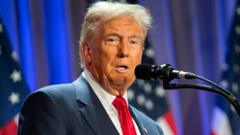The ongoing legal saga surrounding Donald Trump took a notable turn as a federal judge dismissed a key case against him pertaining to his efforts to contest the results of the 2020 presidential election. Special counsel Jack Smith, who initiated the prosecution, had previously requested the dropping of charges based on a longstanding Justice Department policy that generally prohibits the indictment of a sitting president. Judge Tanya Chutkan's ruling was labeled "without prejudice," indicating the possibility that similar charges may be reintroduced following Trump's current term.
In the same vein, Smith has sought to dismiss another case accusing Trump of mishandling classified documents. Trump, who has declared his innocence in both matters, emphasized on social media the inherently political nature of these prosecutions, claiming they represent a form of "political hijacking." JD Vance, Trump's Vice-President-elect, echoed this sentiment, suggesting that the legal systems had been weaponized against him.
After leaving office, Trump entered uncharted legal territory, becoming the first former president to be tried and convicted. However, a summer Supreme Court ruling allowed him certain immunities over prosecutions related to "official acts" during his presidency, which played a pivotal role in the dismissal of the election subversion case.
Upon receiving word of the dismissal, Trump expressed on Truth Social that the federal cases were baseless and indicative of a corrupt political maneuver. As his criminal trials continue to unfurl, the Supreme Court also prepared to reflect on Smith’s attempts to pursue charges related to the classified documents case amidst ongoing legal challenges from Trump’s side.
The dynamics of this legal framework shifted drastically following Trump’s triumph in the recent elections, leading to speculation about the fate of existing indictments and the overall strategy of prosecutors. According to legal expert Neama Rahmani, it’s widely accepted that a sitting president cannot face prosecution, leaving Trump's current ramifications in a precarious state of ambiguity.
As discussions continue regarding the future of Trump’s legal endeavors, both the election case dismissal and the potential classification charges signal significant developments that may influence the landscape of U.S. politics and the legal standards applied to high-ranking officials.
In the same vein, Smith has sought to dismiss another case accusing Trump of mishandling classified documents. Trump, who has declared his innocence in both matters, emphasized on social media the inherently political nature of these prosecutions, claiming they represent a form of "political hijacking." JD Vance, Trump's Vice-President-elect, echoed this sentiment, suggesting that the legal systems had been weaponized against him.
After leaving office, Trump entered uncharted legal territory, becoming the first former president to be tried and convicted. However, a summer Supreme Court ruling allowed him certain immunities over prosecutions related to "official acts" during his presidency, which played a pivotal role in the dismissal of the election subversion case.
Upon receiving word of the dismissal, Trump expressed on Truth Social that the federal cases were baseless and indicative of a corrupt political maneuver. As his criminal trials continue to unfurl, the Supreme Court also prepared to reflect on Smith’s attempts to pursue charges related to the classified documents case amidst ongoing legal challenges from Trump’s side.
The dynamics of this legal framework shifted drastically following Trump’s triumph in the recent elections, leading to speculation about the fate of existing indictments and the overall strategy of prosecutors. According to legal expert Neama Rahmani, it’s widely accepted that a sitting president cannot face prosecution, leaving Trump's current ramifications in a precarious state of ambiguity.
As discussions continue regarding the future of Trump’s legal endeavors, both the election case dismissal and the potential classification charges signal significant developments that may influence the landscape of U.S. politics and the legal standards applied to high-ranking officials.




















